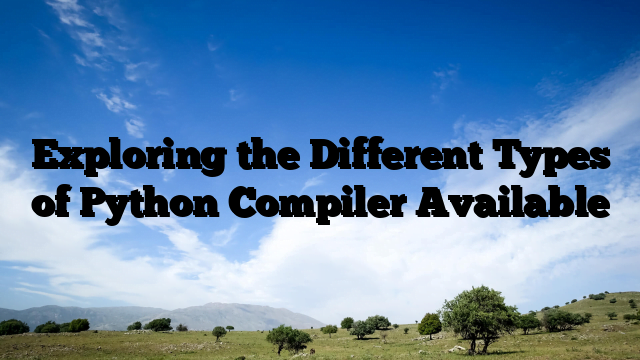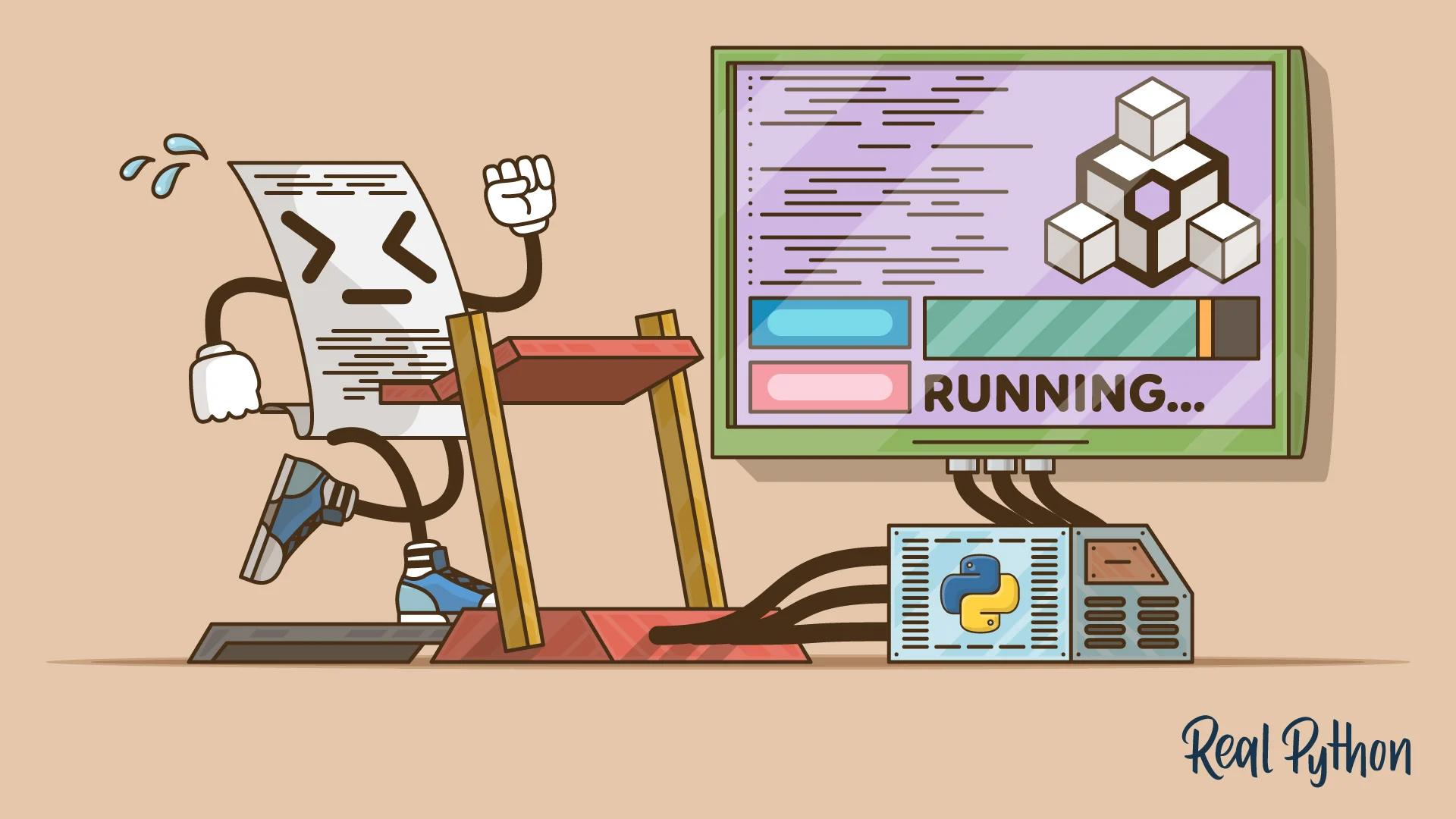- Exploring the Amazing Python Features
- Understanding Memory Management in Python: A Comprehensive Guide
- Exploring the Benefits of Python Programming
- Exploring the Best IDE for Python Programming
- Java or Python: Which Language Holds the Key to Your Programming Success?
- PHP vs Python: Which Language is Best for Your Project?
- From Bugs to Brilliance: Harnessing Python Exceptions for Powerful Coding
- Types of inheritance in python
- How to Create an Android App with Python
- Python vs C++: Uncovering the Best Programming Language for Your Needs
- How should I start learning Python?
- Python Dictionary: A Comprehensive Guide to Understanding and Using Dictionaries
- Introduction to Python Generators: What They Are and How to Use Them
- A Comprehensive Guide to Understanding Python else if Statements for Optimal Decision Making
- Boost Your Programming Skills with Python NumPy: An In-Depth Exploration of Its Features
- Exploring the Different Types of Python Compiler Available
- Understanding Python Tuples: A Comprehensive Guide
- Python List: A Comprehensive Guide to Working with Lists in Python
- Exploring Logical Operators in Python: A Comprehensive Guide
- Exploring the Different Types of Python Operators: A Comprehensive Guide
- A Comprehensive Guide to Python Datatypes
- Introduction to Python for Beginners
- Python Download: Your Comprehensive Guide to Getting Started
- how to comment out multiple lines in python
Python is a powerful and versatile programming language that is used by developers around the world. It is a popular choice for many applications, including web development, data science, and artificial intelligence. As such, it is important to understand the different types of Python compilers available. In this article, we will explore the various Python compilers available, including their features, advantages, and disadvantages. We will also discuss how to choose the right compiler for your project. By the end of this article, you will have a better understanding of the different types of Python compilers and be able to make an informed decision about which one is best for your project.
Overview of Python Compilers
Python is a popular, high-level programming language that is widely used in web development, data science, and software engineering. It is an interpreted language, meaning that code is executed line-by-line instead of being compiled into a single executable. As a result, Python is highly portable and can be used on virtually any platform.
In order to execute Python code, a Python compiler is required. A Python compiler is a program that translates Python code into a language that can be understood by the computer’s processor. This is done by taking the Python code and converting it into a lower-level language such as C or assembly. The compiler then creates an executable file that can be run on the computer.
There are several different types of Python compilers available. The most popular are CPython, PyPy, and Jython. CPython is the standard implementation of Python and is the most widely used. It is written in C and is the most compatible with other Python implementations. PyPy is an alternative implementation of Python that is written in Python itself. It is faster than CPython and is more suitable for applications that require high performance. Jython is an implementation of Python that is written in Java and is designed to be compatible with the Java Virtual Machine.
In addition to these compilers, there are also online Python compilers available. These compilers allow users to write and execute Python code directly in their web browser. This makes it easy to quickly test and debug code without having to install a compiler on their local machine.
Python compilers are an essential part of the Python programming language and are necessary for executing Python code. They provide the ability to quickly and easily execute Python code on virtually any platform. Online Python compilers make it even easier to test and debug code without having to install a compiler on the local machine.
A compiler is a type of computer program that translates source code written in a programming language into a machine-readable form. Compilers are used to create software programs that can be executed on a computer. They are also used to convert existing programs into different languages.
Python is a popular programming language that is used for a variety of tasks, from web development to data analysis. Python is a high-level language, meaning that it is easy to read and understand. It is also an interpreted language, meaning that it does not need to be compiled before it can be executed.
However, Python does require a compiler to create an executable file. This is done by translating the Python code into a lower-level language, such as C or assembly language. This process is known as compilation.
There are several different compilers available for Python. Some of the most popular are CPython, PyPy, and Jython. Each of these compilers has its own advantages and disadvantages. For example, CPython is the most commonly used compiler, but it is not as fast as PyPy or Jython.
In addition to these compilers, there are also online Python compilers available. These compilers allow users to write and execute Python code directly in their web browser. This can be a great way to quickly test out a new idea or experiment with a new language feature.
Compilers are an essential part of the software development process. They allow developers to quickly and easily create programs that can be executed on a computer. By using a compiler, developers can ensure that their code is optimized for the best performance and that it is compatible with the target platform.
Comparing Popular Python Compilers
Python is a popular programming language used by developers around the world. It is a versatile language that can be used for a variety of tasks, from web development to machine learning. As such, there are a number of different Python compilers available for developers to choose from.
A Python compiler is a program that translates Python code into a language that can be read and executed by a computer. Compilers are used to optimize code for speed and efficiency, as well as to ensure that code is compatible with different platforms.
When choosing a Python compiler, it is important to consider the features and capabilities that are important to you. Different compilers offer different levels of support for various Python features, such as debugging, optimization, and platform compatibility.
One popular Python compiler is CPython. CPython is the official implementation of the Python language and is maintained by the Python Software Foundation. It is the most widely used Python compiler and is available for free. CPython is written in C and is optimized for speed and efficiency. It is also highly compatible with most platforms, making it a great choice for cross-platform development.
Another popular Python compiler is PyPy. PyPy is an alternative implementation of the Python language and is written in Python itself. It is optimized for speed and is often faster than CPython. PyPy is also highly compatible with most platforms, making it a great choice for cross-platform development.
Finally, there are a number of online Python compilers available. These compilers allow developers to write and execute Python code directly in their web browser. Online Python compilers are a great choice for those who are just getting started with Python, as they provide an easy way to learn the language without having to install any software.
When choosing a Python compiler, it is important to consider the features and capabilities that are important to you. Different compilers offer different levels of support for various Python features, such as debugging, optimization, and platform compatibility. CPython, PyPy, and online Python compilers are all popular choices, and each has its own advantages and disadvantages.
Understanding Python Compiler Architecture
Python Compiler Architecture is the underlying technology that enables Python be compiled and executed on a computer. It is the set of rules and guidelines that define how Python code is translated into a format that can be understood by a computer.
Python is an interpreted language, meaning that it is not compiled into a native machine code before it is executed. Instead, the Python interpreter reads the source code and executes it directly. The Python compiler architecture is responsible for taking the Python source code and transforming it into a form that can be understood by the interpreter.
The Python compiler architecture consists of several components. The first component is the parser, which reads the source code and breaks it down into a series of tokens. These tokens are then passed to the lexer, which converts them into a series of symbols. The symbols are then passed to the compiler, which generates the intermediate code. This intermediate code is then passed to the interpreter, which executes it.
The Python compiler architecture also includes a number of tools and libraries that are used to facilitate the compilation process. These include the Python Standard Library, which contains a number of modules and functions that are used to simplify the compilation process. Additionally, there are a number of third-party tools and libraries that can be used to further simplify the compilation process.
In addition to the components of the Python compiler architecture, there are also a number of online Python compilers available. These compilers allow users to compile and execute Python code without having to install the Python interpreter on their computer. This makes it easier for users to experiment with Python code without having to worry about the installation process.
Understanding the Python compiler architecture is essential for anyone who wants to use Python effectively. By understanding the components of the architecture, users can better understand how Python code is compiled and executed, and can use the available tools and libraries to simplify the compilation process. Additionally, by using online Python compilers, users can experiment with Python code without having to install the Python interpreter on their computer.
Exploring Open Source Python Compilers
Exploring Open Source Python Compilers is an important part of the Python programming language. A Python compiler is a program that translates Python code into a language that can be understood by a computer. This allows Python code to be executed on a computer without the need for an interpreter.
Open source Python compilers are available for free and can be used to compile Python code into an executable form. These compilers are often used by developers to test their code before deploying it in production. They can also be used to optimize code for faster execution and to create programs that are more efficient.
There are several open source Python compilers available. These include CPython, PyPy, Jython, IronPython, and Shed Skin. Each of these compilers has its own advantages and disadvantages. CPython is the most popular open source Python compiler and is used by most developers. It is written in C and is very fast and efficient. PyPy is a newer compiler that is written in Python and is faster than CPython. Jython is a Java-based compiler that is used to compile Python code into Java bytecode. IronPython is a .NET-based compiler that is used to compile Python code into .NET bytecode. Finally, Shed Skin is a Python-to-C++ compiler that is used to optimize code for faster execution.
In addition to these open source Python compilers, there are also several online Python compilers available. These compilers allow developers to compile Python code directly from their web browser. Some of the most popular online Python compilers include Repl.it, PythonAnywhere, and CodeChef. These compilers are great for testing code quickly and easily without having to install a local compiler.
Exploring open source Python compilers is an important part of the Python programming language. By understanding the different compilers available, developers can choose the best one for their project. In addition, online Python compilers can be used to quickly test code without having to install a local compiler.
In conclusion, Python compilers are an important tool for developers who want to write and execute Python code. There are a variety of different types of Python compilers available, each with its own unique features and advantages. Depending on the specific needs of the developer, one of these compilers may be the best choice for their project. It is important to research the different types of Python compilers available to ensure that the right one is chosen for the job.















